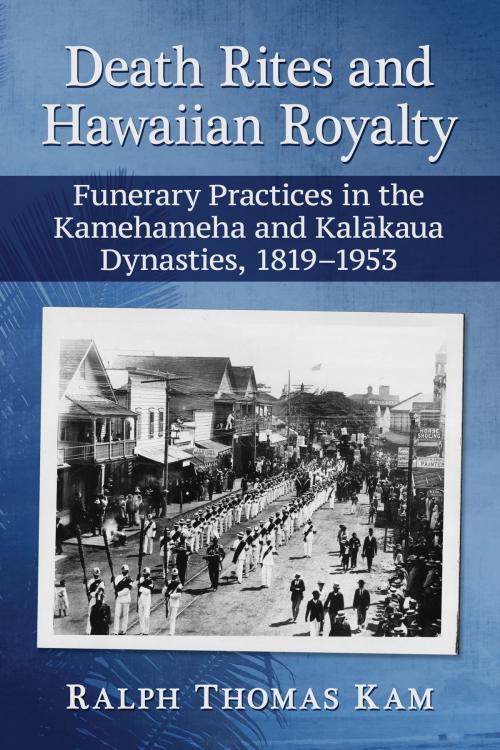Death Rites and Hawaiian Royalty
Funerary Practices in the Kamehameha and Kalakaua Dynasties, 1819-1953
Nonfiction, Social & Cultural Studies, Social Science, Cultural Studies, Death & Dying, History, Americas, United States| Author: | Ralph Thomas Kam | ISBN: | 9781476628615 |
| Publisher: | McFarland & Company, Inc., Publishers | Publication: | October 11, 2017 |
| Imprint: | Language: | English |
| Author: | Ralph Thomas Kam |
| ISBN: | 9781476628615 |
| Publisher: | McFarland & Company, Inc., Publishers |
| Publication: | October 11, 2017 |
| Imprint: | |
| Language: | English |
The bones of Hawaii’s King Kamehameha the Great were hidden at night in a secret location. In contrast, his successor Kamehameha III had a half-mile-long funeral procession to the Royal Tomb watched by thousands. Drawing on missionary journals, government publications and Hawaiian and English language newspapers, this book describes changes in funerary practices for Hawaiian royalty and details the observance of each royal death beginning with that of Kamehameha in 1819. Funeral observances of Western royalty provided an extravagant model for their Hawaiian counterparts yet many indigenous practices endured. Mourners no longer knocked out their teeth or tattooed their tongues but mass wailing, feather standards and funeral dirges continued well into the 20th century. Dozens of historic drawings and photographs provide rare glimpses of the obsequies of the Kamehameha and Kalākaua dynasties. Descriptions of the burial sites provide locations of the final resting places of Hawaii’s royalty.
The bones of Hawaii’s King Kamehameha the Great were hidden at night in a secret location. In contrast, his successor Kamehameha III had a half-mile-long funeral procession to the Royal Tomb watched by thousands. Drawing on missionary journals, government publications and Hawaiian and English language newspapers, this book describes changes in funerary practices for Hawaiian royalty and details the observance of each royal death beginning with that of Kamehameha in 1819. Funeral observances of Western royalty provided an extravagant model for their Hawaiian counterparts yet many indigenous practices endured. Mourners no longer knocked out their teeth or tattooed their tongues but mass wailing, feather standards and funeral dirges continued well into the 20th century. Dozens of historic drawings and photographs provide rare glimpses of the obsequies of the Kamehameha and Kalākaua dynasties. Descriptions of the burial sites provide locations of the final resting places of Hawaii’s royalty.















